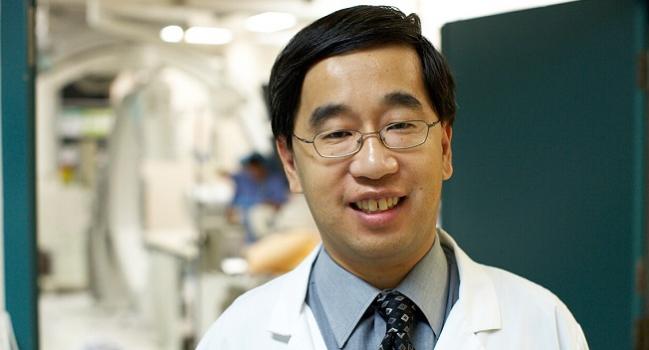Jack V. Tu, Tireless Cardiovascular Researcher and Mentor, Dies at 53
After graduating from medical school at age 23, he built a legacy of professionalism, kindness, and dedication to improving quality of care.

Jack V. Tu, MD, MSc, PhD, a leading cardiovascular epidemiology researcher and a figurehead at the Institute for Clinical Evaluative Sciences (ICES) in Toronto, Canada, for nearly 20 years, died suddenly at home on May 30, 2018. He was 53 years old.
“Jack was an exceptional individual—kind, thoughtful, collegial, collaborative,” Harlan Krumholz, MD (Yale University, New Haven, CT), told TCTMD in an email. “He was beloved by his team, colleagues, and friends. He commanded great respect because of the strength of his ideas and the highly professional way he conducted himself.” Krumholz added that Tu’s death came as a great shock and loss “not only to his family, friends, and colleagues, but also to the world at large.”
Our field has lost one of its great quiet giants. Eric Peterson
Tu joined Sunnybrook Health Sciences Centre in Toronto in 1996 and ICES in 2000, where as a senior scientist he led the cardiovascular outcomes group. In 2006, he became a staff physician in Sunnybrook’s Schulich Heart Centre. For many years he had also served as a professor in the department of medicine and at the Institute of Health Policy, Management and Evaluation at the University of Toronto, building a reputation as a beloved mentor.
In an email to TCTMD, colleague and friend Eric Peterson, MD (Duke Clinical Research Institute, Durham, NC), said he was deeply saddened by the news of Tu’s passing.
“Our field has lost one of its great quiet giants. Jack’s work was always innovative, well done, and directed to helping to promote quality of care,” he recalled. “As a person, Jack was very kind and thoughtful. His work will live on in the programs he built and the mentees he raised.”
A prolific investigator, Tu held a Tier 1 Canada Research Chair in Health Services Research and had published over 300 peer-reviewed journal articles, including 130 in the last 5 years alone. In 2007, he was awarded a Canada Research Chair in Health Services Research, the most prestigious salary award the federal government bestows, which he held continuously. He received the Canadian Institutes of Health Research Article of the Year award in 2010 for a randomized controlled trial showing that public reporting does not improve the quality of cardiac care.
Following his death, colleagues and friends took to Twitter to remember Tu.
I was shocked and stunned yesterday to learn of the loss of Jack Tu of @ICESOntario; a brilliant researcher, kind mentor, eager collaborator, good friend. Thinking of his family, his friends, his colleagues… and our collective loss. He left us far too soon. @denniskomd pic.twitter.com/YjKp8e2zzA
— Harlan Krumholz (@hmkyale) June 1, 2018
I am still in utter shock about the sudden passing my my dear friend and colleague @JackVTu. He has meant so much to many of us in the health services/cardiovascular outcomes community. Will miss you dearly. @CANHEART_News @Sunnybrook @ICESOntario @CircOutcomes pic.twitter.com/UBFbZokfcy
— Dennis Ko (@denniskomd) June 1, 2018
With deep sadness and shock we learned that Dr Jack Tu died last night. Jack was an internationally renowned researcher, an outstanding leader, mentor and colleague @ICESOntario, a loyal friend to so many and above all a loving husband and father. Jack will be sorely missed.
— Michael Schull (@docschull) May 31, 2018
We lost a colleague this week. Jack Tu was a national treasure, one of the most accomplished cardiovascular outcomes researchers in the world. He was also a clinician, a mentor, and an all-around nice guy. It won't be the same here without him. https://t.co/r1Ig6nofR6
— David Juurlink (@DavidJuurlink) June 2, 2018
Titan of Cardiology and Child Prodigy
In an interview with TCTMD, colleague Jacob A. Udell, MD, MPH (University of Toronto, Canada), called Tu a “titan of cardiology,” with endless energy.
“Jack was one of the top publishers in cardiology in the area of implementation sciences as well as health services research,” he said. “I personally learned a lot from his mentorship and through working on a number of papers together. Many people around the world who are already themselves independently considered high-level researchers in the field began their careers working with Jack. His impact on them and others whose lives he touched is incalculable.”
Udell described Tu as a child prodigy who graduated from medical school at age 23. Despite his early and untimely death, Udell said, Tu tirelessly spent 30 years working in a field he loved and making a difference for patients with cardiovascular disease.
His impact on them and others whose lives he touched is incalculable. Jacob A. Udell
In an email, Edward L. Hannan, PhD (University at Albany School of Public Health, Rensselaer, NY), noted to TCTMD that he had the privilege of working with Tu in the early 90s at the start of his cardiovascular outcomes research career and had worked on several studies with him since.
“Jack was a world-class outcomes researcher whose accomplishments and contributions to cardiovascular healthcare in Canada and the world are simply extraordinary,” Hannan said. “Most importantly, he was as fine a person as he was a researcher.”
Photo Credit: University of Toronto
L.A. McKeown is a Senior Medical Journalist for TCTMD, the Section Editor of CV Team Forum, and Senior Medical…
Read Full Bio

Comments